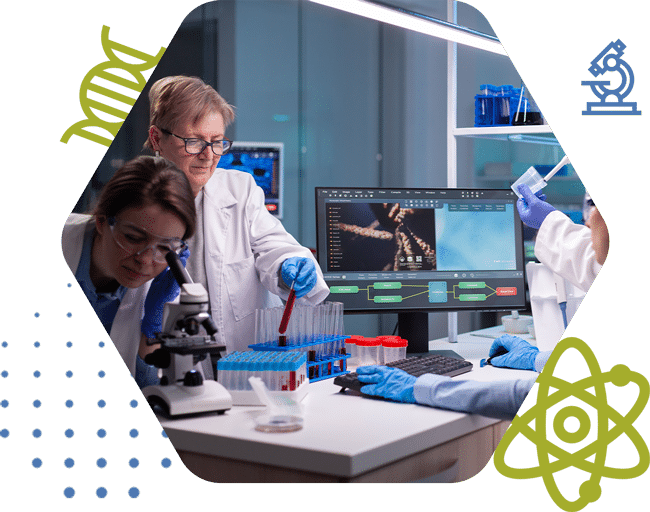Clinical Research at CRN
Understanding Phase I-IV Clinical Trials
Clinical trials are conducted in a series of phases, each with a distinct purpose, to evaluate the safety, efficacy, and overall benefit-risk profile of new drugs and treatments. From initial human testing in Phase I to post-marketing surveillance in Phase IV, each phase plays a critical role in the drug development process.

Phase I Clinical Trials:
Objective: Phase I trials are the first stage of testing in humans and primarily focus on assessing the safety and tolerability of a new drug or treatment. These trials usually involve a small group of healthy volunteers or patients.
Key Activities: Determining the safe dosage range, identifying side effects, and understanding the drug's pharmacokinetics (how the drug is absorbed, distributed, metabolized, and excreted) and pharmacodynamics (the effects of the drug on the body).
Types of Studies:
Single Ascending Dose (SAD) studies
Multiple Ascending Dose (MAD) studies
Food effect studies
Phase II Clinical Trials:
Objective: Phase II trials evaluate the efficacy of a drug, typically in a larger group of patients who have the condition being treated. These trials also continue to assess safety and help determine the optimal dose.
Key Activities: Exploring dose-response relationships, further refining the drug’s safety profile, and gathering preliminary data on the drug’s effectiveness.
Types of Studies:
Phase IIa (Pilot): Focuses on the short-term efficacy of the drug.
Phase IIb (Dose-Ranging): Determines the ideal dose for future trials.
Phase III Clinical Trials:
Objective: Phase III trials involve large-scale testing in a broader patient population to confirm the drug’s efficacy, monitor side effects, and compare it to standard treatments. This phase is crucial for obtaining regulatory approval.
Key Activities: Generating comprehensive safety and efficacy data, confirming the drug’s therapeutic benefits, and providing information needed for labeling and marketing.
Types of Studies:
Randomized Controlled Trials (RCTs)
Comparative effectiveness trials
Phase IV Clinical Trials (Post-Marketing Studies):
Objective: Phase IV trials are conducted after a drug has been approved for use by regulatory authorities. These studies continue to monitor the drug’s safety and effectiveness in the general population and may explore new indications or long-term effects.
Key Activities: Ongoing safety surveillance, evaluating long-term risks and benefits, and identifying rare side effects not observed in earlier trials.
Types of Studies:
Post-marketing surveillance
Comparative effectiveness and safety studies
Studies to explore additional therapeutic uses
Understanding Bioequivalence Studies
Bioequivalence studies are specialized clinical trials that compare the pharmacokinetics of a generic drug to a brand-name reference drug. These studies help confirm that the generic drug is equivalent to the original product in terms of safety, efficacy, and quality, allowing it to be substituted for the brand-name drug.

Key Features of Bioequivalence Studies:
Objective: To demonstrate that the generic drug's rate and extent of absorption (bioavailability) fall within a specific range when compared to the brand-name drug.
Study Design: Typically, these studies involve a crossover design, where participants receive both the generic and the reference drug in a randomized order, with a washout period in between doses.
Regulatory Requirements: Bioequivalence studies are a crucial component of the approval process for generic drugs, ensuring that they meet the same standards of safety and efficacy as the original branded product.
Clinical Trials at CRN: Comprehensive Phase I-IV & Bioequivalence Studies
CRN is a leader in managing and executing clinical trials across all phases of drug development, including bioequivalence studies. Our deep expertise, state-of-the-art facilities, and commitment to quality make us the ideal partner for your clinical research needs.
CRN’s Expertise in Phase I-IV & Bioequivalence Studies
CRN is uniquely positioned to lead and manage clinical trials in both pediatric and adult asthma. Our extensive experience in respiratory research, combined with our nationwide network of research sites, allows us to conduct high-quality, efficient trials that meet the specific needs of asthma patients.
Why Choose CRN for Phase I-IV & Bioequivalence Studies?
Comprehensive Expertise Across All Phases: CRN has extensive experience in conducting clinical trials from Phase I through Phase IV, ensuring a seamless transition between each phase. Our team of experts is adept at managing the complexities of early-phase trials, large-scale Phase III studies, and post-marketing surveillance.
Robust Bioequivalence Capabilities: We specialize in conducting bioequivalence studies that meet stringent regulatory requirements, ensuring that generic drugs are safe and effective alternatives to brand-name products. Our bioequivalence studies adhere to international standards, providing reliable and accurate data for regulatory submissions.
Advanced Research Facilities: Our research sites are equipped with the latest technology and infrastructure necessary for conducting high-quality clinical trials, including pharmacokinetic analysis, laboratory services, and real-time data monitoring. These facilities support accurate data collection, participant safety, and compliance with regulatory standards.
Experienced Clinical Teams: Our team of investigators, clinical research coordinators, and regulatory experts have extensive experience in drug development across various therapeutic areas. They bring a wealth of knowledge and expertise to your study, ensuring that it is conducted efficiently and to the highest standards.
Adaptive Trial Designs: CRN offers flexible and adaptive trial designs tailored to the unique needs of each study. Whether you’re conducting a Phase I dose-escalation study or a Phase IV post-marketing trial, we provide customized solutions that align with your research goals.
Regulatory Compliance and Quality Assurance: Conducting clinical trials across all phases requires strict adherence to regulatory standards, including those set by the FDA, EMA, and other international agencies. CRN provides full regulatory support, ensuring that your study complies with all necessary guidelines. Our commitment to quality assurance guarantees that your trial is conducted according to GCP standards, resulting in credible and reliable data.
Patient-Centric Approach: We prioritize the well-being of our trial participants by adopting a patient-centric approach. This includes providing comprehensive education, ongoing support, and transparent communication throughout the trial process, ensuring high retention rates and a positive experience for participants.
Proven Track Record of Success: CRN has a strong history of success in conducting Phase I-IV trials and bioequivalence studies. Our expertise has made us a trusted partner for pharmaceutical companies, biotech firms, and CROs, helping them bring new therapies and generic drugs to market efficiently and effectively.
Partner with CRN for Your Clinical Trial Needs
Whether you are developing a new drug from the ground up or seeking to bring a generic alternative to market, CRN is your partner in achieving clinical research success. Our experience, resources, and commitment to excellence support the execution of your Phase I–IV and bioequivalence studies with precision, integrity, and professionalism.
Contact CRN today to learn more about how we can support your clinical trials and help bring innovative therapies and generic drugs to patients in need.